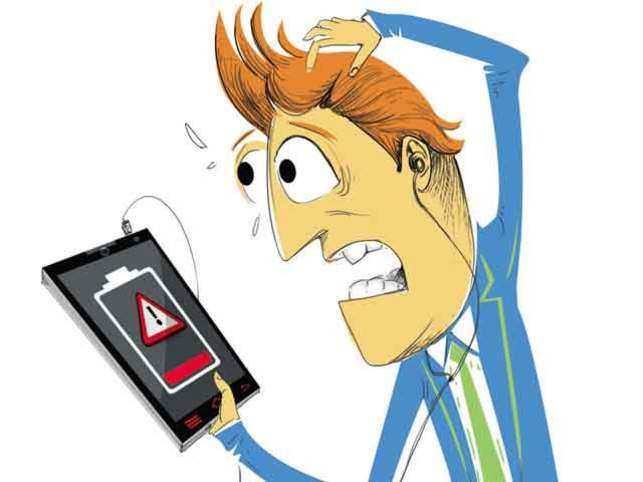Mobile phones have become an integral part of our daily lives. They have revolutionized the way we communicate, work, and socialize. However, for some individuals, the thought of being without their mobile phone can induce a sense of panic and anxiety known as nomophobia.
Nomophobia, short for “no-mobile-phone phobia,” is a relatively new term coined to describe the fear of being without a mobile phone or being unable to use it. It is characterized by feelings of anxiety, stress, and psychological dependence on one’s mobile phone. This fear can be so intense that individuals may go to great lengths to ensure they always have their phone with them.
The prevalence of nomophobia is increasing as more and more people rely on their mobile phones for various aspects of their lives. It has become a common phenomenon in our modern society, affecting individuals across all age groups and demographics. From teenagers who are constantly glued to their screens to professionals who cannot go a few minutes without checking their emails, nomophobia is a real and pervasive fear.
Understanding the underlying causes of nomophobia is crucial in addressing and managing this fear. While there is no single cause, several factors may contribute to its development. These include social and peer pressure, fear of missing out, the need for constant connection and validation, and the fear of being alone or isolated.
What is nomophobia?
Nomophobia is a term that refers to the fear or anxiety of being without a mobile phone or being unable to use one. It is a relatively new term that has emerged in the context of our increasingly mobile-dependent society.
The word “nomophobia” is an abbreviation of “no-mobile-phone phobia”. It was first coined in the early 2000s by the UK Post Office as a marketing term to describe the anxiety people feel when they lose their mobile phones or are unable to use them, often resulting in feelings of panic and distress.
Nomophobia is characterized by a strong emotional response and dependency on mobile phones. Those who experience nomophobia may constantly check their phones, feel anxious when they don’t have immediate access to their phones, or experience symptoms such as restlessness, irritability, and even physical discomfort when separated from their devices.
The fear of being without a mobile phone is often fueled by the need to stay connected, fear of missing out on important information, and the reliance on phones for various daily activities such as communication, navigation, and entertainment. With the increasing integration of smartphones into our everyday lives, nomophobia has become a common phenomenon.
Several studies have been conducted on the impact of nomophobia, highlighting its negative effects on mental health and overall well-being. Excessive phone use and the fear of being without a phone can lead to social isolation, sleep disturbances, decreased productivity, and increased stress levels.
In conclusion, nomophobia is a fear or anxiety associated with the absence or inability to use a mobile phone. It is a phenomenon that has become increasingly common in our technology-driven society and can have negative impacts on mental health. Recognizing and addressing nomophobia is important to maintain a healthy relationship with our mobile devices.
Causes of nomophobia
- Addiction to technology: One of the main causes of nomophobia is the addiction to technology. With smartphones becoming an integral part of our daily lives, many individuals feel anxious and agitated when they don’t have access to their phones.
- Fear of missing out (FOMO): The fear of missing out is another factor that contributes to nomophobia. Many people are afraid that they will miss out on important updates, events, or social interactions if they are not constantly connected to their phones.
- Dependency on social media: Dependency on social media platforms such as Facebook, Instagram, and Twitter also plays a significant role in nomophobia. People feel the need to constantly check their social media accounts and stay connected with their online friends and communities.
- Peer pressure: Peer pressure can also be a cause of nomophobia. Many individuals feel the need to constantly have their phones with them and be connected because their friends and social circles do the same.
- Anxiety and insecurity: Some individuals may experience anxiety and insecurity when they are not able to use their phones. They may rely on their phones as a source of comfort and security, and without them, they may feel disconnected and vulnerable.
- Work demands: Work demands can also contribute to nomophobia. Many individuals feel the need to be constantly available and accessible for work-related matters, making them anxious when they are without their phones.
- Lack of self-control: Lastly, a lack of self-control can also lead to nomophobia. If individuals have difficulty managing their phone usage and have become dependent on their phones for various activities, they are more likely to experience fear and anxiety when they are without them.
Symptoms of nomophobia
Nomophobia, or the fear of being without a mobile phone, can manifest itself in various symptoms. These symptoms can range from mild to severe and can have a significant impact on an individual’s daily life and well-being.
- Anxiety: One of the most common symptoms of nomophobia is anxiety. Individuals may feel a sense of unease or apprehension when they are not able to access their mobile phone.
- Restlessness: Nomophobia can also lead to restlessness. Individuals may feel the constant need to check their phone or engage with it, even in situations where it may not be appropriate.
- Irritability: The inability to use a mobile phone can cause irritability in individuals with nomophobia. They may become frustrated or annoyed when they are unable to use their phone.
- Panic: In more severe cases, nomophobia can lead to panic attacks. Individuals may experience intense fear or dread when they are without their mobile phone.
- Dependency: Nomophobia can also result in a dependency on the mobile phone. Individuals may rely heavily on their phone for communication, entertainment, or social interaction, leading to a sense of dependence.
- Social withdrawal: Some individuals with nomophobia may withdraw from social interactions in favor of using their mobile phone. They may prefer to engage with their phone rather than interacting with others in person.
| Symptom | Description |
|---|---|
| Anxiety | Feelings of unease or apprehension |
| Restlessness | Constant need to check or engage with the phone |
| Irritability | Frustration or annoyance when unable to use the phone |
| Panic | Intense fear or dread without the phone |
| Dependency | Heavy reliance on the phone for communication or entertainment |
| Social withdrawal | Preference for phone use over in-person interactions |
The effects of nomophobia
Nomophobia, or the fear of being without a mobile phone, can have various negative effects on individuals’ mental and physical well-being. Here are some notable effects:
- Anxiety and stress: Nomophobia can lead to feelings of anxiety and stress when individuals are separated from their phones. The fear of missing out on important messages or updates can trigger these negative emotions.
- Dependency: Excessive reliance on mobile phones can result in dependency, where individuals feel incapable of functioning without their devices. This dependency can affect one’s ability to focus on tasks, interact with others, and engage in real-life activities.
- Reduced productivity: Constant phone checking and addiction to social media apps can significantly decrease productivity. This can affect both academic and professional life, leading to missed deadlines, poor performance, and decreased overall efficiency.
- Physical health issues: Spending excessive time on mobile devices can lead to various physical health problems. These include eye strain, neck and back pain from poor posture, headaches, and disrupted sleep patterns.
- Social isolation: Nomophobia can contribute to social isolation as individuals prioritize virtual interactions over real-life interactions. This can lead to a lack of meaningful connections, feelings of loneliness, and decreased overall well-being.
It is important to acknowledge the potential negative effects of nomophobia and take measures to maintain a healthy relationship with mobile devices. Setting boundaries, practicing digital detoxes, and finding alternative ways of relaxation and entertainment are some strategies that can help combat nomophobia’s adverse effects.
Overcoming Nomophobia
Nomophobia, or the fear of being without a mobile phone, is a widespread issue in today’s society. However, it is important to take steps to overcome this fear and establish a healthier relationship with technology. Here are some strategies to help you overcome nomophobia:
- Recognize the problem: The first step in overcoming nomophobia is to acknowledge that it is a problem affecting your daily life. Take some time to reflect on how much time you spend on your phone and the impact it has on your well-being.
- Set boundaries: Establishing clear boundaries with your phone can help reduce the fear of being without it. Set specific times and locations where you will not use your phone, such as during meals or before bedtime.
- Practice mindfulness: Engage in activities that help you be present in the moment and reduce your reliance on your phone. This can include meditation, taking walks in nature, or spending quality time with loved ones.
- Find alternative activities: Explore new hobbies and interests that do not involve your phone. This can include reading books, practicing a musical instrument, or engaging in physical exercise.
- Disconnect regularly: Plan regular periods of time where you disconnect from your phone completely. This could be a few hours each day or a full day each week. Use this time to focus on other aspects of your life and enjoy activities that bring you joy.
- Seek support: If you find it difficult to overcome nomophobia on your own, consider seeking support from friends, family, or a therapist. They can provide guidance and encouragement as you work towards a healthier relationship with your phone.
Remember, overcoming nomophobia is a journey that requires patience and self-reflection. By implementing these strategies, you can gradually reduce your fear of being without a mobile phone and improve your overall well-being.
Nomophobia in the modern world
Nomophobia, which stands for “no-mobile-phone phobia,” is a term used to describe the fear of being without a mobile phone or the inability to use one’s phone. In today’s modern world, where smartphones have become an integral part of our lives, nomophobia has become a prevalent issue.
Mobile phones have revolutionized the way we communicate, work, and access information. They have become a constant companion, providing us with instant connections to the world around us. As a result, the fear of being without a mobile phone has become increasingly common.
One of the main reasons why nomophobia is so prevalent in the modern world is the dependency on smartphones for various tasks. People rely on their phones for staying connected with friends and family, managing work-related tasks, accessing social media, and even for entertainment purposes.
In addition to dependency, the fear of missing out (FOMO) also contributes to nomophobia. With the constant influx of information on social media platforms, individuals have a fear of missing out on important events, news, or updates. This fear drives them to constantly check and stay connected to their smartphones.
The advancement of technology and the rise of social media have also played a significant role in the development of nomophobia. The fear of being disconnected from social media platforms or missing out on updates from friends and followers can lead to anxiety and a constant need for validation through mobile devices.
Furthermore, the constant notifications and alerts from various apps and messages can create a sense of urgency and anxiety. The fear of missing an important call or message can cause individuals to continuously check their phones, even in situations where it may be inappropriate or disruptive.
Addressing nomophobia in the modern world is crucial for maintaining a healthy balance between technology and personal well-being. Recognizing the signs of nomophobia, such as excessive phone use, anxiety when separated from one’s phone, and prioritizing phone use over real-life interactions, is an important first step.
Setting boundaries and practicing mindfulness can help individuals manage nomophobia. This includes establishing screen-free times or zones, taking breaks from constant phone use, and engaging in activities that do not involve the use of mobile phones.
Ultimately, understanding nomophobia in the modern world is essential for individuals to maintain a healthy relationship with their mobile phones and to ensure that they do not become overly dependent or consumed by their devices.
Tips for reducing nomophobia
Overcoming nomophobia can be a challenging process, but with the right strategies and mindset, it is possible to reduce your dependency on your mobile phone. Here are some tips to help you overcome nomophobia:
- Set boundaries: Establish specific rules and limitations for your phone usage. This could include designating phone-free zones or setting aside specific times of the day where you disconnect from your device.
- Practice mindfulness: Take the time to be present and aware of your surroundings. Instead of constantly reaching for your phone out of habit, try to engage with the present moment and focus on the people and activities around you.
- Engage in other activities: Find hobbies or activities that you enjoy and actively participate in them. By engaging in activities that do not involve your phone, you can reduce the amount of time and energy you dedicate to it.
- Limit notifications: Adjust your phone settings to limit the number of notifications you receive. By reducing the constant interruptions, you can regain control over your phone usage and reduce the anxiety associated with missing out on something important.
- Practice self-reflection: Take the time to reflect on why you may feel anxious or dependent on your phone. Identify any underlying emotions or fears that may be driving your nomophobia and address them appropriately.
- Establish a support system: Reach out to friends or family members who can support you in reducing your phone usage. Having someone to hold you accountable and provide encouragement can make the process easier.
- Find alternative coping mechanisms: Explore other ways to manage stress or boredom that do not involve your phone. This could include exercise, meditation, journaling, or engaging in creative activities.
Remember, reducing nomophobia is a gradual process, so be patient with yourself. Celebrate the small victories and keep working towards a healthier relationship with your mobile phone.
Seeking professional help
If you believe you are suffering from nomophobia and it is significantly impacting your life, seeking professional help is a recommended course of action. Mental health professionals, such as psychologists or therapists, can provide valuable guidance and support in overcoming this fear.
When seeking professional help, it is important to find a therapist who has experience in treating anxiety disorders or phobias. They will be able to help you navigate your fear of being without a mobile phone and develop coping strategies to manage your anxiety.
A therapist may use various therapeutic approaches, such as cognitive-behavioral therapy (CBT), exposure therapy, or mindfulness techniques to address nomophobia. These techniques can help you challenge irrational thoughts and fears, gradually expose yourself to situations without a phone, and learn relaxation techniques to manage anxiety.
In addition to therapy, support groups or online communities can also be beneficial. Connecting with others who are going through similar struggles can provide comfort and a sense of belonging. Hearing about others’ experiences and coping strategies can also be helpful in managing your own fears.
If you are unsure where to find a mental health professional, you can start by asking your primary care physician for a referral or searching online directories for therapists specializing in anxiety disorders. It is important to choose a therapist whom you feel comfortable with and trust, as the therapeutic relationship plays a crucial role in the effectiveness of treatment.
Remember, seeking professional help is a positive step towards overcoming nomophobia and improving your overall well-being. You don’t have to face your fears alone, and with the right support, you can regain control over your fear of being without a mobile phone.
Questions and answers
What is nomophobia?
Nomophobia is the fear or anxiety of being without a mobile phone or being unable to use one’s phone for any reason.
How is nomophobia diagnosed?
Nomophobia can be diagnosed through self-assessment questionnaires or by a mental health professional.
What are the symptoms of nomophobia?
The symptoms of nomophobia can include anxiety, restlessness, discomfort, irritability, panic, and an overwhelming need to be constantly connected to one’s mobile phone.
Is nomophobia a serious condition?
Nomophobia can vary in severity, but for some individuals, it can have a significant impact on their daily lives and mental well-being.
What causes nomophobia?
Nomophobia can be caused by a variety of factors, including dependence on technology, fear of missing out, social anxiety, and a need for constant validation and stimulation.
How can nomophobia be treated?
Nomophobia can be treated through various methods such as therapy, counseling, cognitive-behavioral techniques, and reducing phone usage gradually.


